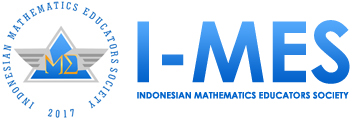Pengaruh Problem-Based Learning dengan Permainan “Jelajah Waktu” terhadap Kemampuan Pemecahan Masalah Matematis di SD
DOI:
https://doi.org/10.35706/sjme.v8i1.10580Abstract
This research aims to find out how the problem-based learning (PBL) model with the "Time Exploration" game affects students' mathematical problem solving abilities, as well as to find out which learning model is better. This type of research is quasi-experimental with a pretest-pottest control group design research design. The population used was class III elementary school students in South Sumedang District with a research sample of class III at SDN Sukaraja II. The problem solving ability test with descriptive questions was the instrument in this research. Then the data analysis technique was carried out using the average difference test (paired sample t-test and independent sample t-test) and the gain test which was previously tested for normality and homogeneity. The research results show that there is a positive influence through the application of the PBL model with the "Time Exploration" game on students' problem solving abilities and shows an increase of 0.46 in the experimental class which is classified as a moderate increase. Then, it was also concluded that PBL learning with the "Time Exploration" game was better than conventional learning.
Downloads
References
Albab, R. U., Wanabuliandari, S., & Sumaji, S. (2021). PENGARUH MODEL PROBLEM BASED LEARNING BERBANTUAN APLIKASI GAGUNG DURAN TERHADAP KEMAMPUAN PEMECAHAN MASALAH SISWA. AKSIOMA: Jurnal Program Studi Pendidikan Matematika, 10(3), 1767. https://doi.org/10.24127/ajpm.v10i3.3969
Aliah, S. N., & Bernard, M. (2020). Analisis Kesulitan Siswa dalam Menyelesaikan Soal Pemecahan Masalah Berbentuk Cerita pada Materi Segitiga dan Segiempat. Suska Journal of Mathematics Education, 6(2), 111. https://doi.org/10.24014/sjme.v6i2.9325
Astuti, D. A. P., Slameto, & Setyaningtyas, E. W. (2018). PENGARUH MODEL PEMBELAJARAN PROBLEM BASED LEARNING TERHADAP KEMAMPUAN PEMECAHAN MASALAH MATEMATIKA SISWA SEKOLAH DASAR.
Astutiani R, Isnarto, & Hidayah, I. (2019). Kemampuan Pemecahan Masalah Matematika dalam Menyelesaikan Soal Cerita Berdasarkan Langkah Polya. Prosiding Seminar NasionalPascasarjana UNNES SEMINAR NASIONAL PASCASARJANA.
Damayanti, M. (2022). STRATEGI PEMBELAJARAN MENGATASI KESULITAN ANAK SEKOLAH DASAR DALAM MENGERJAKAN SOAL CERITA MATEMATIKA. 2 St Proceeding STEKOM, 2022.
Hake, R. R. (1999). ANALYZING CHANGE/GAIN SCORES. https://web.physics.indiana.edu/sdi/AnalyzingChange-Gain.pdf
Hanifah, M., & Indarini, E. (2021). Efektivitas Model Pembelajaran Discovery Learning dengan Model Problem Based Learning terhadap Kemampuan Pemecahan Masalah Siswa di Sekolah Dasar. Jurnal Basicedu, 5(4), 2571–2584. https://doi.org/10.31004/basicedu.v5i4.1261
Hasanah, N., Lubis, R. R., & Sari, B. P. (2020). PENGARUH MODEL PROBLEM BASED LEARNING TERHADAP KEMAMPUAN PEMECAHAN MASALAH SISWA SEKOLAH DASAR. Jurnal Sintaksis: Pendidikan Guru Sekolah Dasar, IPA, IPS Dan Bahasa Inggris, 2(1).
Hayati, R., Armanto, D., & Zuraini, Z. (2023). UPAYA MENINGKATKAN KEMAMPUAN PEMECAHAN MASALAH SISWA MELALUI MODEL PROBLEM BASED LEARNING BERBANTUAN MULTIMEDIA INTERAKTIF. AKSIOMA: Jurnal Program Studi Pendidikan Matematika, 12(1), 1549. https://doi.org/10.24127/ajpm.v12i1.6534
Irnawati, Gunayasa, I. B. K., & Turmuzi, M. (2020). PENGARUH MODEL PROBLEM BASED LEARNING (PBL) TERHADAP KEMAMPUAN MENYELESAIKAN SOAL CERITA METEMATIKA SISWA KELAS V ARTICLE INFO ABSTRACT. Pendas:Primary Education Journal, 1(2). http://journal.unram.ac.id/index.php/jiwpp
Isrok’atun, & Rosmala, A. (2018). Model-Model Pembelajaran Matematika (B. S. Fatmawati, Ed.). PT. Bumi Aksara.
Maulana. (2017). Konsep Dasar Matematika dan Pengembangan Kemampuan Berpikir Kritis-Kreatif (R. Irawati, Ed.; 1st ed.). UPI Sumedang Press.
Meika, I., Pratidiana, D., & Safitri, E. (2022). Analisis Kemampuan Pemecahan Masalah Matematis Siswa Kelas VII Dalam Menyelesaikan Soal Cerita Pada Materi Himpunan Informasi Artikel ABSTRAK. SJME (Supremum Journal of Mathematics Education), 6(1), 75–84. https://doi.org/10.35706/sjmev6ì1.5764
Ningrum, P. W., Nuraeni, F., & Caturiasari, J. (2023). Pengaruh Penerapan Model Problem Based Learning (PBL) Terhadap Kemampuan Pemecahan Masalah Siswa Sekolah Dasar Pada Pembelajaran Matematika. Al Qodriri: Jurnal Pendidikan, Sosial Dan Keagamaan, 21(2), 646–652. https://doi.org/10.53515/qodiri
Pamungkas, D. F. (2018). PENGARUH MODEL PROBLEM BASED LEARNING TERHADAP KEMAMPUAN PEMECAHAN MASALAH MATEMATIKA THE EFFECT OF PROBLEM BASED LEARNING TOWARD PROBLEM SOLVING SKILLS OF MATHEMATIC.
Peraturan Menteri Pendidikan dan Kebudayaan Nomor 21 Tahun 2016, (2016).
Pranoto, I., Budhi, W. S., & Gunawan, H. (2023, December 14). Hasil PISA 2022, Matematika Indonesia masih Stagnan . Media Indonesia.
Sahrudin, A. (2018). PENGEMBANGAN METODE PROBLEM BASED LEARNING MELALUI PERMAINAN ENGKLEK UNTUK MENINGKATKAN THINKING MATH PESERTA DIDIK MA GLOBAL SCHOOL. SJME (Supremum Journal of Mathematics Education), 2(1), 32–43.
Saputri, Y., & Wardani, K. W. (2021). Meta Analisis: Efektivitas Model Pembelajaran Problem Solving dan Problem Based Learning Ditinjau Dari Kemampuan Pemecahan Masalah Matematika SD. Jurnal Cendekia: Jurnal Pendidikan Matematika, 05, 935–948.
Satya, M. A., Putri, A. D., & Nizar, H. (2022). Analisis Kemampuan Pemecahan Masalah Matematis pada Pembelajaran Matematika Dilihat dari Tipe Kepribadian Peserta Didik. SJME (Supremum Journal of Mathematics Education), 6(2), 211–221. https://doi.org/10.35706/sjme.v6i2.5786
Setyaningsih, R., & Rahman, Z. H. (2022). PENGARUH MODEL PROBLEM BASED LEARNING TERHADAP KEMAMPUAN PEMECAHAN MASALAH SISWA. AKSIOMA: Jurnal Program Studi Pendidikan Matematika, 11(2), 1606. https://doi.org/10.24127/ajpm.v11i2.5098
Sugiyono. (2013). Metode penelitian pendidikan pendekatan kuantitatif, kualitatif dan R&D.
Widyastuti, R. T., & Airlanda, G. S. (2021). Efektivitas Model Problem Based Learning terhadap Kemampuan Pemecahan Masalah Matematika Siswa Sekolah Dasar. Jurnal Basicedu, 5(3), 1120–1129. https://doi.org/10.31004/basicedu.v5i3.896
Downloads
Published
How to Cite
Issue
Section
License

This work is licensed under a Creative Commons Attribution-ShareAlike 4.0 International License.
Authors who publish with this journal agree to the following terms:
- Authors retain copyright and grant the journal right of first publication with the work simultaneously licensed under a Creative Commons Attribution License that allows others to share the work with an acknowledgment of the work's authorship and initial publication in this journal.
- Authors are able to enter into separate, additional contractual arrangements for the non-exclusive distribution of the journal's published version of the work (e.g., post it to an institutional repository or publish it in a book), with an acknowledgment of its initial publication in this journal.
- Authors are permitted and encouraged to post their work online (e.g., in institutional repositories or on their website) prior to and during the submission process, as it can lead to productive exchanges, as well as earlier and greater citation of published work (See The Effect of Open Access).










